Blandine Ebinger (1899-1993) was a German cabaret singer and actress. Author Erich Kästner described her as “This lisping, scrawny person with the big, severe eyes is a master of the tragic-grotesque.” Her cinema career continued for seventy (70!) years. Her more than 90 film roles were once bigger, once smaller, but all her characters were distinguished through her impressive acting.
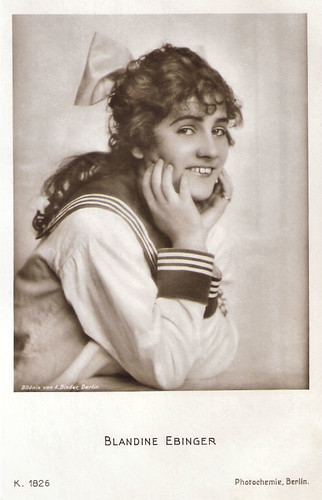
German postcard by Photochemie, Berlin, no. K. 1826. Photo: Alex Binder, Berlin.
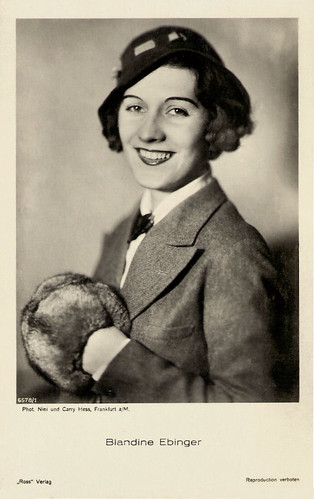
German postcard by Ross Verlag, no. 6578/1, 1931-1932. Photo: Nini and Carry Hess, Frankfurt a/M.
Blandine Ebinger was born as Blandine Loeser into an acting family in 1899. Her mother was the actress Margarete Wezel and her father was the pianist Gustaf Loeser. She started her stage career at the age of eight at the Leipziger Schauspielhaus and was regularly engaged as a child actress. In 1913 followed work at the Trianon-Theater, and in 1916 at the Residenz-Theater.
At the age of 17 she made her film debut in Der zehnte Pavillon der Zitadelle/The Tenth Pavillion of the Citadel (Danny Kaden, 1917). She also had a role in the debut film of Friedrich Wilhelm Murnau, Der Knabe in Blau/Emerald of Death (F.W. Murnau, 1919), now considered as lost.
As a teenager, she already sang in Berlin cabarets like Café Größenwahn and Cabaret Schall und Rauch. There she met her first husband, Friedrich Hollaender, who composed the song cycle Lieder eines armen Mädchens (Songs of a Poor Girl) for her. In the 1920s she became with her performances in clubs like Kabarett der Komiker one of the biggest stars of the cabaret scene of Berlin. With her songs and ballads, she was the voice for the social misery of the Weimar period.
She also acted in several silent films like the Harry Liedtke serial Der Mann ohne Namen/The Man Without a Name (Georg Jacoby, 1921), Die Ratten/The Rats (Hanns Kobe, 1921), Sie und die Drei/She and the Three (Ewald André Dupont, 1922), Mysterien eines Frisiersalons/The Mysteries of a Hairdresser's Shop (Bertolt Brecht, Erich Engel, 1923), Kopf hoch, Charly!/Heads Up, Charley (Willi Wolff, 1926) and Violantha (Carl Froelich, 1928) starring Henny Porten.
Ebinger easily made the transfer to sound film in such productions as Unheimliche Geschichten/The Living Dead (Richard Oswald, 1932) and the Hans Fallada adaptation Kleiner Mann - was nun?/Little Man What Now (Fritz Wendhausen, 1933) starring Hermann Thimig.
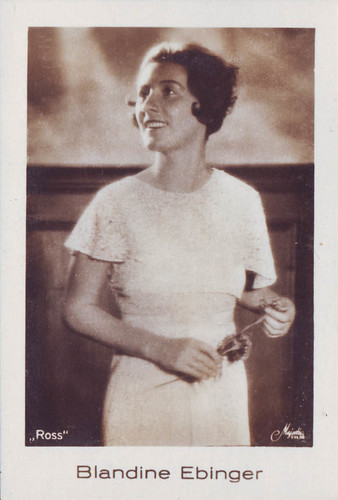
Collectors Card by Ramses Filmbilder. Photo: Majestic Film / Ross. Collection: Manuel Palomino Arjona.
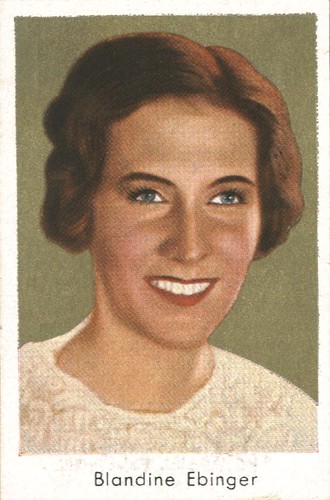
Collectors Card by Gold Film Bilder. Collection: Manuel Palomino Arjona.
In 1933 Blandine Ebinger took over the Tingel-Tangel-Theater. Blandine and Friedrich Hollaender ended their marriage before he emigrated to the United States because of the increasingly hostile environment for Jewish citizens in the early 1930s. Blandine nevertheless faced discrimination as a result of the marriage, much of which was directed at their half-Jewish daughter, Philine.
In the first years after the Nazis came into power she performed only smaller film roles in productions like Die Liebe siegt/Love Conquers (Georg Zoch, 1934) and Der Berg ruft/The Mountain Calls (Luis Trenker, 1937). Blandine performed in anti-Nazi cabarets in Munich and Zurich and moved in 1937 to the USA. She had a hard time in Hollywood and was given only minor parts such as an uncredited part in Prison Ship (Arthur Dreifuss, 1945) with Nina Foch.
In 1946 she returned to Europe and after performing in Zürich she went back to Berlin in 1948. The first years she lived in the DDR and made four DEFA films, including Affaire Blum/The Affair Blum (Erich Engel, 1948), Epilog: Das Geheimnis der Orplid/Epilogue (Helmut Käutner, 1950) and the satire Der Untertan/The Underdog (Wolfgang Staudte, 1951).
In the 1950s she acted in West German film productions like Verrat an Deutschland/Betrayal of Germany (Veit Harlan, 1955) starring Kristina Söderbaum, the comedy Vatertag/Father's Day (Hans Richter, 1955), the Hollywood production Fräulein (Henry Koster, 1958) with Mel Ferrer, the Romy Schneider remake of Mädchen in Uniform/Girls in Uniform (Géza von Radványi, 1958) and Und das am Montagmorgen/And That on Monday Morning (Luigi Comencini, 1959) with O.W. Fischer.
In 1961 she was awarded the Filmband in Gold for the best female supporting role in Der letzte Zeuge/The Last Witness (Wolfgang Staudte, 1960). But for all, she was a stage performer. Between 1974 and 1982 she once more sang her chansons in Paris, Amsterdam, Los Angeles and other cities. With those chanson evenings, she kept the spirit of the Berlin cabarets of the 1920s awake. In 1983 she was awarded the Bundesverdienstkreuz (Germany's Cross of Merit) and the Filmband in Gold for her work in the German cinema. In her eighties she still played small parts in films and on TV, as in Wir – zwei/We Two (Ulrich Schamoni, 1970) and Der Teufel kam aus Akasawa/The Devil Came from Akasava (Jesus Franco, 1971) with Fred Williams. Her last TV performance was in 1988. Blandine Ebinger died in 1993 in Berlin. She was 94 years old. Her second husband was the publisher Dr. Helwig Hassenpflug.

German postcard by Ufa, Berlin-Tempelhof, no. FK. 4571. Photo: CCC / NF-Film / Arthur Grimm. Publicity still for ... Und das am Montagmorgen/And That on Monday Morning (Luigi Comencini, 1959).
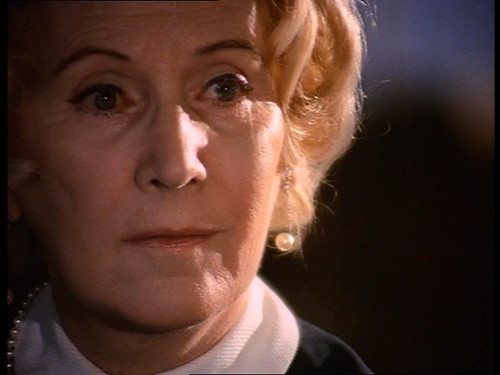
Photo from Der Teufel kam aus Akasawa/The Devil Came from Akasava (Jesus Franco, 1971). Collection: The Wild Eye (Flickr).
Sources: Helwig Hassenpflug (Blandine-Ebinger.de - now defunct), Thomas Staedeli (Cyranos), Defa-sternstunden (now defunct), Wikipedia, and IMDb.
This post was last updated on 7 February 2024.

German postcard by Photochemie, Berlin, no. K. 1826. Photo: Alex Binder, Berlin.

German postcard by Ross Verlag, no. 6578/1, 1931-1932. Photo: Nini and Carry Hess, Frankfurt a/M.
Star of the Berlin cabaret scene
Blandine Ebinger was born as Blandine Loeser into an acting family in 1899. Her mother was the actress Margarete Wezel and her father was the pianist Gustaf Loeser. She started her stage career at the age of eight at the Leipziger Schauspielhaus and was regularly engaged as a child actress. In 1913 followed work at the Trianon-Theater, and in 1916 at the Residenz-Theater.
At the age of 17 she made her film debut in Der zehnte Pavillon der Zitadelle/The Tenth Pavillion of the Citadel (Danny Kaden, 1917). She also had a role in the debut film of Friedrich Wilhelm Murnau, Der Knabe in Blau/Emerald of Death (F.W. Murnau, 1919), now considered as lost.
As a teenager, she already sang in Berlin cabarets like Café Größenwahn and Cabaret Schall und Rauch. There she met her first husband, Friedrich Hollaender, who composed the song cycle Lieder eines armen Mädchens (Songs of a Poor Girl) for her. In the 1920s she became with her performances in clubs like Kabarett der Komiker one of the biggest stars of the cabaret scene of Berlin. With her songs and ballads, she was the voice for the social misery of the Weimar period.
She also acted in several silent films like the Harry Liedtke serial Der Mann ohne Namen/The Man Without a Name (Georg Jacoby, 1921), Die Ratten/The Rats (Hanns Kobe, 1921), Sie und die Drei/She and the Three (Ewald André Dupont, 1922), Mysterien eines Frisiersalons/The Mysteries of a Hairdresser's Shop (Bertolt Brecht, Erich Engel, 1923), Kopf hoch, Charly!/Heads Up, Charley (Willi Wolff, 1926) and Violantha (Carl Froelich, 1928) starring Henny Porten.
Ebinger easily made the transfer to sound film in such productions as Unheimliche Geschichten/The Living Dead (Richard Oswald, 1932) and the Hans Fallada adaptation Kleiner Mann - was nun?/Little Man What Now (Fritz Wendhausen, 1933) starring Hermann Thimig.

Collectors Card by Ramses Filmbilder. Photo: Majestic Film / Ross. Collection: Manuel Palomino Arjona.

Collectors Card by Gold Film Bilder. Collection: Manuel Palomino Arjona.
Hard times in Nazi Germany and in Hollywood
In 1933 Blandine Ebinger took over the Tingel-Tangel-Theater. Blandine and Friedrich Hollaender ended their marriage before he emigrated to the United States because of the increasingly hostile environment for Jewish citizens in the early 1930s. Blandine nevertheless faced discrimination as a result of the marriage, much of which was directed at their half-Jewish daughter, Philine.
In the first years after the Nazis came into power she performed only smaller film roles in productions like Die Liebe siegt/Love Conquers (Georg Zoch, 1934) and Der Berg ruft/The Mountain Calls (Luis Trenker, 1937). Blandine performed in anti-Nazi cabarets in Munich and Zurich and moved in 1937 to the USA. She had a hard time in Hollywood and was given only minor parts such as an uncredited part in Prison Ship (Arthur Dreifuss, 1945) with Nina Foch.
In 1946 she returned to Europe and after performing in Zürich she went back to Berlin in 1948. The first years she lived in the DDR and made four DEFA films, including Affaire Blum/The Affair Blum (Erich Engel, 1948), Epilog: Das Geheimnis der Orplid/Epilogue (Helmut Käutner, 1950) and the satire Der Untertan/The Underdog (Wolfgang Staudte, 1951).
In the 1950s she acted in West German film productions like Verrat an Deutschland/Betrayal of Germany (Veit Harlan, 1955) starring Kristina Söderbaum, the comedy Vatertag/Father's Day (Hans Richter, 1955), the Hollywood production Fräulein (Henry Koster, 1958) with Mel Ferrer, the Romy Schneider remake of Mädchen in Uniform/Girls in Uniform (Géza von Radványi, 1958) and Und das am Montagmorgen/And That on Monday Morning (Luigi Comencini, 1959) with O.W. Fischer.
In 1961 she was awarded the Filmband in Gold for the best female supporting role in Der letzte Zeuge/The Last Witness (Wolfgang Staudte, 1960). But for all, she was a stage performer. Between 1974 and 1982 she once more sang her chansons in Paris, Amsterdam, Los Angeles and other cities. With those chanson evenings, she kept the spirit of the Berlin cabarets of the 1920s awake. In 1983 she was awarded the Bundesverdienstkreuz (Germany's Cross of Merit) and the Filmband in Gold for her work in the German cinema. In her eighties she still played small parts in films and on TV, as in Wir – zwei/We Two (Ulrich Schamoni, 1970) and Der Teufel kam aus Akasawa/The Devil Came from Akasava (Jesus Franco, 1971) with Fred Williams. Her last TV performance was in 1988. Blandine Ebinger died in 1993 in Berlin. She was 94 years old. Her second husband was the publisher Dr. Helwig Hassenpflug.

German postcard by Ufa, Berlin-Tempelhof, no. FK. 4571. Photo: CCC / NF-Film / Arthur Grimm. Publicity still for ... Und das am Montagmorgen/And That on Monday Morning (Luigi Comencini, 1959).

Photo from Der Teufel kam aus Akasawa/The Devil Came from Akasava (Jesus Franco, 1971). Collection: The Wild Eye (Flickr).
Sources: Helwig Hassenpflug (Blandine-Ebinger.de - now defunct), Thomas Staedeli (Cyranos), Defa-sternstunden (now defunct), Wikipedia, and IMDb.
This post was last updated on 7 February 2024.
4 comments:
love the Romy Schneider postcard...a wonderful actress - such a tragic life...
Amazing how you find all these great stories and images Bob.
Whenever I visit your blog, I am amazed by the stories of actors and actresses I've not heard of, but should have. You keep their stories alive here. I'm SO glad you are doing this. Miss you for Postcard Friendship Friday. It has been harder to keep up these days--I have been in and out because of a great tragedy in my life. Better now, but it will still take time. Have a great summer, friend. The sunshine brings such cheer.
Thank you, Beth, for stopping by. Good to hear from you and a wonderful summer to you too.
Post a Comment